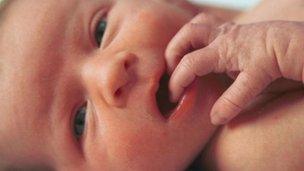Funding boost for babies and toddlers in poor areas
- Published

Flying Start provides child care and health visits for families in poorer areas
The Welsh government says it will double the number of children benefiting from a pre-school programme for disadvantaged families.
Ministers have earmarked an extra £55m for the Flying Start scheme over three years, which will include free part-time child care in poor areas.
It came as the Children's Commissioner for Wales warned of the impact of UK-wide budget cuts.
Keith Towler said he feared more families would be pushed into poverty.
The Flying Start funding is intended to meet one of Labour's top five pledges at May's assembly election.
The government is also changing the way the money is handed out, using data on benefits instead of a system for ranking deprived communities.
Officials say the new method will make it less likely that families will lose out if they live in small pockets of poverty within comparatively well-off areas.
Ministers want to increase the number of children under four years old who are in the programme from 18,000 to 36,000.
The childcare, delivered through local councils, is available for children between their second and fourth birthdays.
'Tough times'
Deputy children's minister Gwenda Thomas said: "These are tough times for families and we must prioritise the needs of the poorest and protect the most vulnerable.
"This is why we have made the commitment to double the number of children benefiting from Flying Start. It is one of our top five pledges for a fairer future."
Spread over three years, the £55m will be on top of annual funding of £39m a year.
Following research it conducted with Daycare Trust, the charity Save the Children recently warned the soaring cost of child care was pushing the poorest out of work in Wales.
Daycare Trust chairman Anand Shukla said spending money on children's early years had been shown to deliver high returns by preventing problems later in life.
Providing high quality care with qualified staff helped tackle child poverty by allowing parents the time to work, he said.
"You need affordable child care for families to be able to go out to work," he said.
"The fact that at a time of economic difficulty the Welsh government has expanded funding in this area is very much to be welcomed."
It came as the Children's Commissioner for Wales Keith Towler told BBC Wales that the Welsh and UK governments need to refocus their efforts on tackling child poverty.
Mr Towler said: "Whilst there are developments to be proud of, we continue to see some of our society's most vulnerable being denied a childhood."
He said at the heart of their concerns were the high levels of "persistent poverty" across the UK.
"We fully acknowledge the considerable challenges facing governments on all levels and that tough decisions have to be made," said Mr Towler.
"But we are deeply concerned that, without assessing the impact of the severe cuts we've seen at all levels of government, we're in real danger of pushing more families into poverty."
The UK government says its benefits changes should cut child poverty and that the best way to do this is through parents working and its policy would "make sure work pays".
A rising number of Welsh children are classed as being in poverty because they live in homes with an income less than 60% of the median.
The proportion of poor children fell between 1997 and 2003 to 28%, but has since risen to 33%. This compares to 30% for the UK.
A separate report, published on Monday, warns that thousands of children in Wales are being denied rights, enshrined in international law, because of the high levels of poverty.
- Published21 November 2011
- Published7 September 2011
- Published9 February 2011